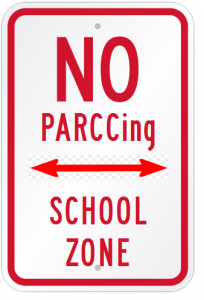1) The Massachusetts Board of Elementary and Secondary Education (BESE) voted this fall to begin pilot testing PARCC exams to see if we should move from our current MCAS tests to these new exams. The plan is to include 15% of the state’s students in approximately 2/3 of state schools. (For more, see our PARCC test fact sheet, here.)
2) Is opting out an option? More and more parents, teachers, school committee members and superintendents believe parents should be able to decide whether their children participate in these trials.
3) The Massachusetts Department of Elementary and Secondary Education (DESE) released a legal opinion saying that parents have no right to refuse PARCC testing for their children. Here’s their argument, in a letter to the Worcester School Committee.
4) Other legal experts and a number of federal and state legal precedents raise significant questions about their interpretation, arguing that parents have interests and responsibilities regarding their children over and beyond the interests of the state.
5) In the wake of the MA DESE opinion, both the Worcester and Norfolk School Committees passed resolutions saying parents in those districts can opt out of PARCC without negative repercussions. The Worcester vote was unanimous. The Mendon-Upton Regional School District is informing parents of their right to opt their children out of PARCC tests. Other school committees are considering similar resolutions. (Click here for our current list of school committees with opt-out policies.)
6) The DESE’s argument relies primarily on Massachusetts’ Chapter 69 statute, which requires the state to assess student learning but does not require that each and every living, breathing child in Massachusetts take these assessments. Nor does it say that parents have no right to refuse.
7) The DESE argument does not address the critical fact that the PARCC exams are part of a pilot program. In other words, this is research. DESE is attempting to mandate the participation of minor children in a research project.
8) According to state and federal law, international protocol, and ethical standards for human research, no one can compel ANYONE to take part in an experiment, let alone minor children without parental consent.
9) Your child’s test refusal need not have a negative impact on the school’s accountability status. PARCC pilot test results have no bearing on a school’s accountability score. NOTE, however, that the state still requires students to take and pass the 10th grade MCAS in math and English as well as a science MCAS to graduate from high school (at least through 2016).
What You Can Do if You Don’t Want Your Child to Participate in PARCC Testing:
1) Join with other parents in your community and urge your school committee to follow the lead of Worcester, Norfolk, Mendon-Upton and others in allowing parents to refuse testing for their children. Insist that such resolutions describe how schools will ensure that students can engage in alternative educational programming.
2) Write letters to the editor and guest commentaries in your community newspaper to let others know your views on the right of parents to refuse PARCC testing.
3) Write a letter to your child’s teacher, principal, the superintendent and school board saying that you refuse to consent to your child’s inclusion in the PARCC Pilot test program and you expect the school to provide alternative educational programming during the test administration. (For a basic model letter, click here.)
4) Know that, while instances of bullying and intimidation have been reported, children whose parents opt them out have the opportunity to spend the time learning instead of filling in bubbles. For example, teachers who refused to administer tests in one Chicago public school used the time instead to provide quality educational programming to students whose parents had refused the testing.

